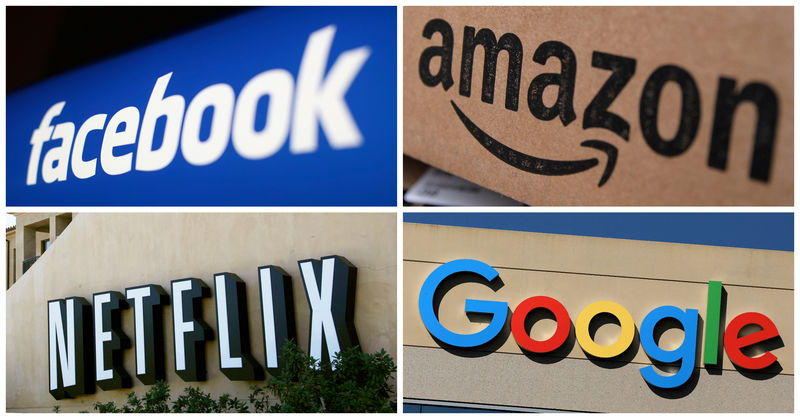This post was originally published on this site
https://i-invdn-com.akamaized.net/news/LYNXNPEE8J1FR_M.jpg
Investing.com — The FAANG stocks have had a good coronavirus crisis, but investors should start thinking about whether these gains can continue. Peter Nurse argues that the group is behaving like the dotcom’s in 1999, before the bursting of that first internet bubble. Yasin Ebrahim makes the case that the group offers investors a chance to buy the dip amid fears of a second wave of coronavirus lockdowns.
The Bear Case
While the U.S. economy has struggled to recover from the mass unemployment and output collapse caused by the social distancing measures used to combat the virus, Wall Street has bounced back strongly from the initial crash, powered by all-powerful tech stocks.
Facebook (NASDAQ:FB), Apple (NASDAQ:AAPL), Amazon (NASDAQ:AMZN), Microsoft (NASDAQ:MSFT), Alphabet (NASDAQ:GOOGL), or the so-called Fab 5, making up 40% of the Nasdaq Composite Index, have shown to be big winners when the world goes into lockdown.
Facebook, Amazon, Apple and Netflix (NASDAQ:NFLX) have all hit record highs this month, while Google owner Alphabet isn’t far removed.
These stocks now have a combined market capitalization of over $4.7 trillion, meaning the market cap of the Nasdaq Composite is concentrated in the five largest stocks to a degree not witnessed since the peak of the Tech bubble at the turn of the century.
“The market has favoured these companies and they have been flavour of the month since the Covid pandemic erupted,” said Zehrid Osmani at Legg Mason affiliate Martin Currie. “The risk now is that these obvious beneficiaries of lockdown have been bid up a lot, and now it’s a question of what is in the price going forward.”
And they are starting to look expensive.
For example, Netflix is currently trading on a price/earnings ratio of around 94, which compares with 78.35 at the end of last year when the Covid-19 outbreak was not a consideration in any investors’ thought process. Amazon’s current P/E stands around 131, versus 80.31; Apple above 28, versus 23.20 and so on.
These companies are also all now facing a number of pressing fundamental issues.
Amazon and Google face the hard stare of regulatory scrutiny for possible anti-competitive business practices. Netflix is competing with a number of new rivals in streaming video as well as having to cope with the extremely expensive business of producing new content.
European competition officials have already announced investigations into both Apple’s App Store and its payment platform, Apple Pay, while the U.S. Department of Justice has long been rumoured to be on the verge of doing something similar.
Facebook and Google have already had to cope with a sharp drop in advertising spending during the coronavirus pandemic, and are going to have to compete with the major broadcasters for likely reduced advertising budgets going forward.
The Wall Street Journal reported last week that U.S. advertising spending is expected to plunge by 13% this year, according to research from GroupM, a unit of advertising giant WPP (LON:WPP) PLC. It was only in December it was forecasting U.S. ad spending would rise by 4% in 2020.
The social media companies, including Facebook, have drawn the ire of President Donald Trump, who signed an executive order to roll back their legal protections after accusing them of trying to silence conservative voices.
On the flip side, Verizon (NYSE:VZ) announced Thursday it was pulling its advertising from Facebook, the biggest name so far in a growing movement to boycott the social network for not doing enough to stop hate speech on its platforms.
On top of this, Facebook and Google have been criticized for lack of data privacy and security.
Despite their valuations increasing during the crisis, the profits at the tech giants have actually fallen along with the rest of the market, said Societe Generale’s ultra-bear Albert Edwards in a research note late last month, and unless a cyclical recovery is on the cards this is set to continue.
“I personally suspect that this recession will ultimately expose these and the tech sector to be far more cyclical than appreciated. And it will be difficult in that environment to maintain their 32x forward PE,” Edwards added.
The Bull Case: Second Wave Fears a Second Chance to Buy the Dip

